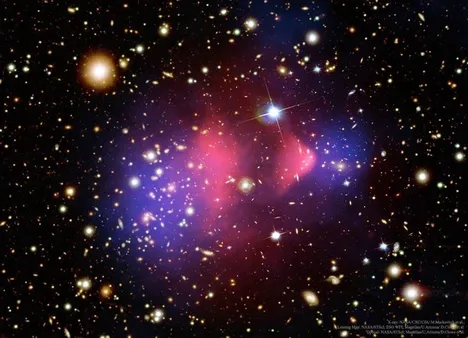Dark Matter

The nature of "Dark Matter" is one of the most profound open questions in current research, at the interface of particle and astrophysics. Dark Matter is a form of non-luminous matter whose presence in our Universe is inferred from its gravitational impact, ranging from length scales of galaxies all the way to cosmological scales. Observations of anisotropies in the cosmic microwave background imply a Dark Matter density that is about five times higher than that of ordinary matter.
While there are many hypotheses about what Dark Matter could be, a plausible explanation is that it consists of a new particle species, that interacts so weakly with ordinary matter that it has not yet been detected in the laboratory. Furthermore, the observed distribution of galaxies implies that Dark Matter clusters gravitationally, suggesting that it is "cold", i.e. has a sufficiently non-relativistic velocity distribution.
In the T31 group we study the connections of Dark Matter to particle physics, deriving predictions for various models for the nature and interactions of Dark Matter particle candidates within theories beyond the Standard Model of particle physics. This includes in particular the production mechanism in the Early Universe, predictions for indirect detection via Dark Matter annihilation, and tests of Dark Matter models via structure formation.
- Precision predictions for Weakly Interacting Massive Particle (WIMP) Dark Matter candidates described by electroweak multiplets (aka Higgsino, Wino), that require resummation techniques known in collider physics for computing the relic density and annihilation spectrum (Sommerfeld effect, Sudakov resummation)
- Dark Matter production beyond the WIMP mechanism, including conversion-driven freeze-out and taking bound state effects into account
- Probes of dark sector models via structure formation, featuring e.g. interactions of Dark Matter with a dark radiation component, self-interacting or decaying dark matter
You can find a list of publications from T31 in the INSPIRE HEP database
You can find information on master and bachelor thesis topics here